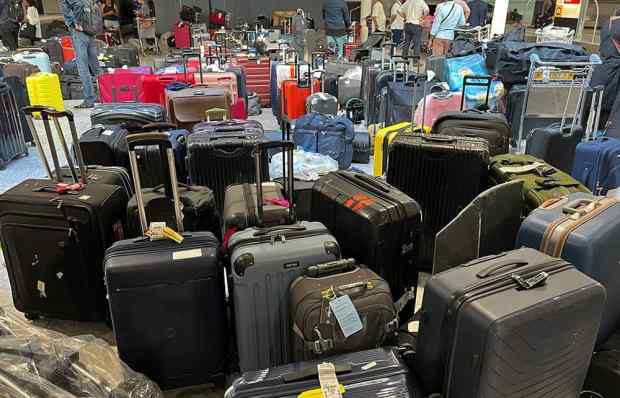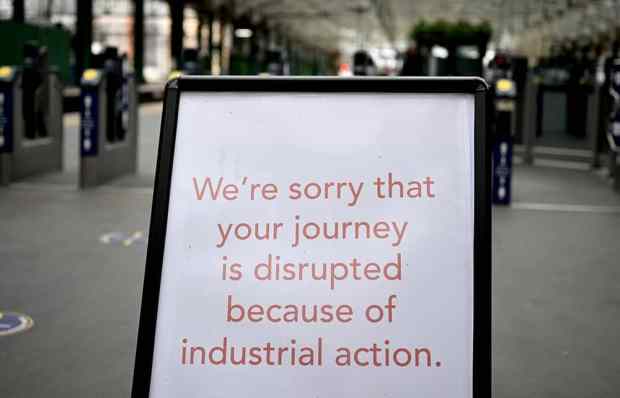What’s the very worst line of business you could be in, if we’re heading for a no-deal Brexit? Not finance, for sure: there’s a noticeable absence of squealing from the City, which has evidently made all the contingency plans it needs to continue making numbers dance on screens and booking the proceeds in convenient domiciles. Car manufacturing, on which I’ve written so much in recent weeks, clearly has its challenges — but the impediments of Brexit are no more than a tiresome sideshow compared to the industry’s wider technological and market issues. Fishing has been a bad career choice ever since we joined the Common Market and probably can’t get much worse. But the one thing you really wouldn’t want to be right now, I suggest, is a sheep farmer.
Let me précis a passage from Michael Gove’s speech to last week’s NFU conference, in which he expressed eloquent sympathy for farmers without offering any certainty as to the conditions under which they will operate beyond this month. ‘As things stand… there’s no absolute guarantee that we would be able to continue to export food to the EU,’ he warned. The EU says it will levy full external tariffs on all food: that means at least 40 per cent on sheep meat, of which 90 per cent of UK exports go to the EU, France in particular.
Other EU nations from Spain to Romania would rapidly muscle in on French demand, while New Zealand and Australia would still have tariff-free quotas for meat exports to the EU — but we would not. And if we’re still able to sell into the EU at all, our meat will go via Calais as at present, but will have to be thoroughly checked. The French promised some time ago to invest in the necessary inspection capacity, but ‘as I speak’, Gove went on, ‘there are no border inspection posts at Calais. None.’ So lorry queues will be inevitable and huge.
Here on the edge of the North York Moors where I live, many of my neighbours are upland sheep farmers who have scraped the toughest of livings under the EU regime. As Gove also remarked, ‘a majority of farmers voted for Brexit’. But they surely don’t deserve the harsher fate that now hangs over them.
Sold at last
The former NatWest branch in my town of Helmsley — left empty and shamefully unmaintained for four years by NatWest’s troubled parent, RBS, despite frequent reminders from this column — was -finally sold last week at auction in Leeds for £406,000, double its ‘guide price’. Viewings attracted a circus of chancers and would-be bidders from afar, fuelling rumours as to the building’s next purpose ranging from Costa to ‘vaping lounge’. The only thing we’re sure it won’t be is a tattoo parlour, since one of those opened last year but closed within weeks, having attracted no trade.
I bring you this news partly as a parable of small-town life and partly because I sense it marks what’s now fashionably called an inflection point in the UK real estate scene. Take a close look at retail-related commercial property on a larger scale: -Hammerson, the blue-chip shopping mall specialist, reported a £267 million loss and a plan to sell off a half-billion worth of assets, while declaring ‘we do not expect to commit to any major projects until markets stabilise’; its competitor Intu, owner of Lakeside and the Trafford Centre, lost £1.2 billion last year after a huge write-down of its portfolio.
As for residential sales down south — generally the most resilient of property sectors — the high-gloss London estate agency Foxtons was also expected to announce 2018 losses this week, after what its chief executive Nic Budden described as ‘one of the toughest sales markets we’ve ever had in London with transactions falling from [2017’s] historically low levels’. Foxtons’ bellwether share price currently stands at just 15 per cent of its peak five years ago.
I’m pleased our NatWest building has new owners at last, and I bet NatWest was pleased with the price. But I can’t help feeling the buyer has overpaid in a market that’s sickly and turning sicklier. If I were a boss at any bank with big bricks-and-mortar exposures, commercial or residential, I would be urgently reviewing my loan portfolio — and searching for veteran managers who remember how to handle a property crash.
Model proprietor
I last spoke to Bruno Schroder at a memorial gathering for Richard Roberts — the official historian of the merchant bank turned investment house of which Bruno, who died last week aged 86, was the gently eccentric major shareholder. A pricklier ego might have resented the fact that Roberts -afforded only 39 words, in 600 pages, to Bruno’s -legacy as the firm’s longest–serving non–executive director. But the billionaire himself was always happier flying his plane and tending his Hebridean estate, and was apparently unoffended by (or perhaps un-aware of) the tendency of colleagues to dismiss his ideas and snigger behind his back.
Schroders — where, as it happens, I began my own City career — would have become a very different business if the proposal favoured by Bruno in 1976 to appoint James Wolfensohn (a feisty Australian who later ran the World Bank) as chairman had not been outvoted in the boardroom in favour of the safer Earl of Airlie. Not long after that decision, I witnessed for myself how this great-great-grandson of the bank’s German founder was regarded. One day I picked up someone else’s ringing phone to find Bruno on the other end, politely asking for reams of client data. Unsure how to respond, I consulted a senior director: ‘If Mr Schroder asks you to do anything else,’ he barked, ‘Don’t do it. Just refer him to me.’
But Bruno’s trust in capable executives and sincere concern for the firm’s wellbeing were reasons why his family still has control of a business worth £7 billion today, when most of its City peer group are long gone: for all his foibles, history will say he was a model proprietor.
Got something to add? Join the discussion and comment below.
Get 10 issues for just $10
Subscribe to The Spectator Australia today for the next 10 magazine issues, plus full online access, for just $10.
You might disagree with half of it, but you’ll enjoy reading all of it. Try your first month for free, then just $2 a week for the remainder of your first year.















Comments
Don't miss out
Join the conversation with other Spectator Australia readers. Subscribe to leave a comment.
SUBSCRIBEAlready a subscriber? Log in